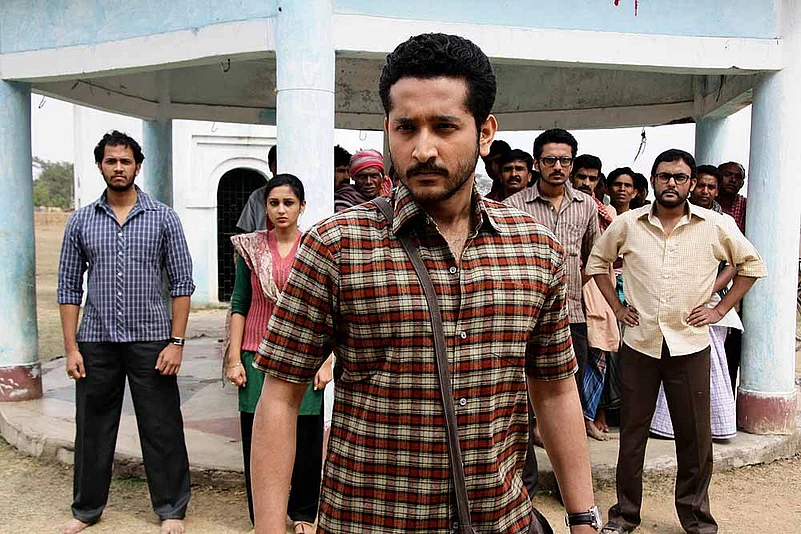“It’s a shame that Bengal has not erupted into flames of anger over the murder of Barun Biswas,” exclaims 60-year-old Nondolal Poddar, an elder at Sutia, a remote village near the India-Bangladesh border where the 39-year-old schoolteacher lived and died. Rather, he was killed. “So it is some comfort to me,” Poddar continues, “that even though in real life everyone seems to have forgotten him, at least in the film someone cares enough to take revenge.”
Director Raj Chakraborty’s film Proloy (Apocalypse), a biopic on Biswas, strays considerably from the actual turn of events following the cold-blooded murder of the anti-rape crusader who battled political goons to end an era of sexual violence targeting local women. Though a few dissenters in Sutia point to the discrepancies between the real and reel, they are drowned by the arguments of those who insist that the fictionalised narrative is a reflection of what they “actually feel like doing, but are simply too afraid to do”.
The film’s first part sticks closely to the real plot (see Portrait of a Young Man, Outlook, January 21). For years, Sutia—here named Dukhiya—had been in the control of political goons. Biswas, known for his altruism—“he spent his salary on buying books for the poor and medicine for the needy”, villagers claim—took on the goons. His relentless battle to get them arrested finally paid off. In early 2012, five members of the notorious gang—including kingpin and dreaded criminal Sushanta Choudhury—were put away behind bars. The violence stopped. But Biswas became a marked man. To this day, no arrest has been made in connection with Biswas’s murder.

Photograph by Sandipan Chatterjee
This shameful fact—a reflection of the criminal-politician-police nexus—is powerfully delineated, and forms the basis of the film’s second part. “The fact that it is this part—the portion showing justice being delivered—that has to be fictionalised speaks for itself,” explains the director. The post-interval half takes on the police, the politician and the criminal without mercy, viciously stamping out obstacles on the path of justice—including legal constraints or ethical considerations.
“The truth is when I have been so horribly violated by a gang of men who attacked me like mad dogs, I don’t want to hear about our prissy little laws which will take their own sweet time in delivering sorry punishment in some vague future, that too if our country’s powerful politician-criminal nexus allows it to,” says a Calcutta rape-survivor who watched the movie. “So it was cathartic for me to see just deserts being delivered to these grotesque men by an honest cop and an angry citizen. This is the kind of punishment I want for my rapists, who are still out there.”
Proloy has an irreverent, almost obnoxious crime branch detective discarding moderate Gandhian values and launching a vengeful offensive that pays the criminals back in their own coin. Played by Saswata Chatterjee (Bob Biswas in Kahaani), the character’s complete disregard for the non-violent path seeks to convey, in dramatised form, the rage boiling at a corner of the nation’s collective unconscious as it waits indefinitely, case after case, for justice. Another character—an old man played by Paran Banerjee—doesn’t have any qualms about taking the law into his own hands. “Paran’s character does what we wanted to do to those thugs,” chuckles an old woman in Sutia. “But I guess I would have landed up in jail for it,” she says.
“It must be emphasised repeatedly that the fictionalised sequence is not something fantastic or impossible to achieve. The action is not of a superhero. Just that of an honest cop. And a fellow citizen who has not succumbed to fear,” director Chakraborty points out. There are other minor (and expected) detours. The cinematic Barun is also, evidently, more romantic than the real one. His sister Promilla Biswas tells us, “He didn’t have any time for love, though almost all the girls in the village wanted to marry my brother.” The name of the fictional Barun’s love interest, symbolically, is Durga.
“No, the real Barun did not have so much support,” a villager says sadly. “He was a lone crusader. In that sense he was greater than his film version.”


























